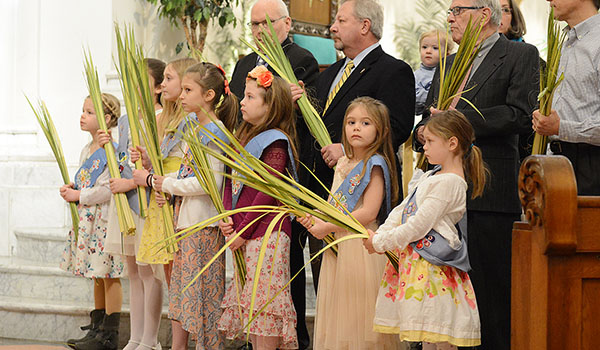Palm Sunday a symbol of hope in times of abandonment and betrayal
by PATRICK J. BUECHI
"Hosanna to the son of David" sang the choir as the celebration of Palm Sunday began. "Blessed is he that cometh in the name of the Lord. Hosanna in the highest."
Those words come from the Gospel of Mark and describe Jesus coming into Jerusalem for what would be His crucifixion.
Bishop Richard J. Malone used Mark's Gospel during his Palm Sunday celebration March 25 at St. Joseph Cathedral in downtown Buffalo, where about 600 people participated in the Mass that began Holy Week.
"Today, we gather together to herald with the whole Church the beginning of the celebration of our Lord's paschal mystery. That is to say, of His Passion and Resurrection. For it was to accomplish this mystery that He entered His own city of Jerusalem," Bishop Malone said in his welcoming. "Therefore, with all faith and devotion, let us commemorate the Lord's entry into the city for our salvation, following in His footsteps, so that by being made by His grace, partakers of the cross, we may have a share also in His resurrection and in His life."
The bishop then blessed palm fronds that were distributed to all those gathered.
Unique from typical Sunday Mass, the Gospel reading of Mark 14:1-15:47 was not read as a monologue by a deacon, but as a script, narrated by Msgr. Paul A. Litwin, chancellor of the Diocese of Buffalo and Deacon David Rotterman, with the congregation playing the part of the crowd witnessing Jesus' arrest and crucifixion, and Bishop Malone playing the lead role.
In his homily, Bishop Malone explained that, unlike Luke and John's accounts of the Passion, Mark writes of Jesus saying only one thing, "My God, my God, Why have You forsaken Me?"
"We know, thank God, that this Holy Week into which we enter concludes with the glorious brilliant light of resurrection at Easter, but between now and then, what a breathtaking story of utter abandonment and abject betrayal of the Lord Jesus. Mark's Jesus is totally abandoned during this sorrowful passion. From the moment in Gethsemane, when He faces arrest, His abandonment only deepens."
The betrayal of Jesus by Judas, the bishop explained, is a story of "profound sadness." Jesus is arrested, and His apostles run off. Those who were His friends and even witnessed the miracles He performed, had left Him. Peter, who had boasted that he would not deny Jesus, denies even knowing Him. "So, Jesus faces His accusers alone," the bishop explained. "Most terrible of all, when you think about it, the desperate sense of complete abandonment even by God His Father, whose will He was following as He, in freedom, underwent this terrible sufferings."
"Such abandonment of the innocent and betrayal of the powerless continues to happen now in our time, in our world, in our nation," the bishop said, bringing the congregation back to the present time. "Whether it is the tragic abandonment in the deepest sense of preborn infant children, or whether it is the terrible struggle that is imposed in so many ways to refugees ... or even in our Church as we struggle with issues of abuse. Palm Sunday makes us face all of these tragic facts of our own time as well. The world is not without tragedy and betrayal still. Original Sin is alive and doing its damage every day. But, Jesus entered into all of this in the human experience, into this abandonment and powerlessness totally and freely for one reason, out of love for you, and for me, and for all of human kind.
"Holy Week allows us to reflect on all of this and let it touch our hearts, not just as 2,000-year-old history, but as something that was profoundly, dramatically different that cut through it all ultimately, as we will celebrate in a few days at Easter."
The palm, Bishop Malone explained to a congregation still holding fronds in their hands, is a symbol of hope. "A reminder that what seemed to be the end was to be only the beginning. Jesus seemingly overcome by the forces of evil and sin and death, Jesus really has the last word. He was, He is the last word. And it is not a word of abandonment, but of abundance. It is God's glorious word of endless reconciliation and peace, grace, joy and hope, and of much needed healing for our world, for our Church, for each of us," he concluded.
At the end of the service, Bishop Malone thanked those who came, and encouraged everyone to participate in the Masses of Holy Week, especially the Triduum. "This is really the high point of our whole liturgical year," he said.
Bishop Edward U. Kmiec, retired bishop of Buffalo; Father Charles E. Slisz, rector of St. Joseph Cathedral; and Msgr. Litwin concelebrated the Mass. A reception followed in the cathedral's social hall.
Before the Mass began, Deacon Paul Cygan, a transitional deacon currently serving at the cathedral, delivered a message from Bishop Malone on the clergy abuse stories that have been making headlines in recent weeks. Apologizing for what he called a "catastrophic breach of trust," the bishop asked that anyone who has been abused to contact Jacquie Joy, the diocesan victim's assistant coordinator, at 716-895-3010.
"I want to encourage each of you to keep the faith. The Diocese of Buffalo is committed to correcting the mistakes and sins of the past, while we continue to assist victims," the letter concluded.




